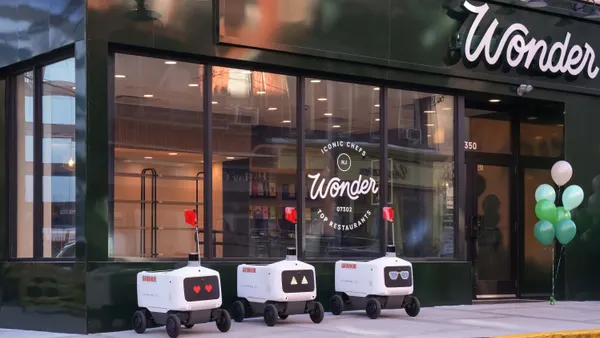Dive Brief:
- Kitchen United, the 2-year-old virtual kitchen concept, has secured a $40 million Series B round of funding, co-led by RXR Realty, one of New York City’s largest real estate owners, and Alphabet's investment arm GV, according to a press release.
- The funding will enable Kitchen United to enter the New York City market, operating in RXR properties and other spaces in the tri-state area.
- Kitchen United is also eyeing properties in Chicago, Los Angeles, San Francisco and Boston to build upon its existing portfolio of Pasadena, California, and Chicago and, soon, Scottsdale, Arizona, and Austin, Texas.
Dive Insight:
Since launching in 2017, a growing number of restaurant concepts have signed up to leverage Kitchen United's virtual kitchen spaces to meet their growing off-premise demand. Among them are Wetzel's Pretzels, Halal Guys and Dog Haus. With this funding, on top of a $10 million investment from GV last year, the company is showing no signs of slowing down and, in fact, expects to build 400 kitchen centers and 5,000 kitchens in the next few years.
Kitchen United is hardly alone in the burgeoning space. Heavyweight Uber Eats is among its competitors and has more than 1,600 virtual restaurants open in 300 cities. Virtual kitchen startup Keatz just secured its own round of funding to the tune of $13.5 million, while ClusterTruck raised $10 million. One way Kitchen United is working to stand out from the crowd is by prioritizing the employment piece. It hosted culinary boot camps for potential hires, for example.
There are plenty of incentives for brands to expand through a virtual kitchen format. For starters, they provide a low-cost entry into new markets, which is especially appealing for independent restaurants. As operators navigate cost pressures like labor, saving on occupancy rates — which can take up to 8% to 10% of a restaurant's gross sales — can ease a significant burden on a low-margin business. This is especially true in a market like New York, which has the highest retail rents in the world after Hong Kong. Brands that have been wanting to expand in this busy and saturated market may be more inclined to do so if they're able to relieve some of these capital pressures.
For more established brands, virtual kitchens allow them to try new markets and menu innovations without the expense of opening a traditional restaurant. According to Fast Company, traditional restaurants can risk around $800,000 to test new menu items, but if a menu fails at a ghost restaurant, it costs about $25,000.
These concepts also provide fulfillment help during peak delivery times without slowing down the restaurant's back-of-the-house operations for its traditional business. This is becoming a much bigger deal as off-premise demand grows. According to William Blair & Company, U.S. off-premise restaurant sales in 2018 were $279 billion and are projected to grow to $402 billion in 2022. And with $40 million in new funding, Kitchen United will be well positioned to help restaurants capture a portion of these sales.










